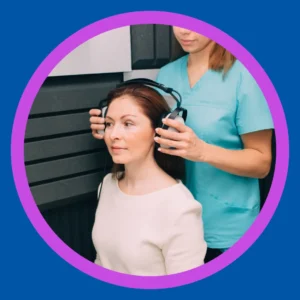It’s National Protect Your Hearing Month!
October marks National Protect Your Hearing Month. It’s a reminder that hearing loss often starts quietly, with daily habits that seem harmless.
If you’ve ever wondered how to protect your hearing, now is the time to act. A few simple changes today can make a big difference tomorrow.
Why Hearing Loss Happens More Often Than You Think
Hearing loss is far more common than most people realize. About one in three adults between 65 and 74 experiences some level of hearing loss. For those over 75, the number rises to nearly one in two. But it doesn’t just affect older adults. Many people start losing hearing earlier in life without even noticing.
It’s Not Just About Age
While aging plays a role, it’s only part of the picture. The structures of the ear change over time, and nerve pathways may weaken. However, other lifestyle and health-related factors often cause or accelerate hearing loss.
Some of the most common causes include:
- Repeated exposure to loud noise
- Use of ototoxic medications (drugs that damage hearing)
- Chronic illnesses such as diabetes or heart disease
- Infections that affect the ear or nervous system
- Smoking and poor blood circulation
Unlike vision problems, hearing damage often progresses without pain or obvious symptoms. That’s why it’s frequently overlooked until communication becomes difficult.
Two Main Types of Hearing Loss
To protect your hearing, it helps to understand what kind of hearing loss you might be at risk for. The two most common types are:
- Sensorineural Hearing Loss: Damage to the inner ear or hearing nerve, often permanent.
- Conductive Hearing Loss: Blockage or damage in the outer or middle ear, sometimes reversible.
You can learn more about the differences in this detailed guide to hearing loss types.
Knowing what causes hearing loss empowers you to prevent it. And when it comes to your hearing, prevention is always easier than treatment.
Everyday Noise Is the Leading Cause of Preventable Hearing Loss
Noise is all around us—at work, at home, in gyms, and during everyday activities. While aging is a common cause of hearing loss, the most preventable cause is something many people ignore: excessive sound. Noise-induced hearing loss (NIHL) can happen suddenly or build up over time, and the damage is often permanent.
How Loud Is Too Loud?
Your ears are sensitive instruments. Sounds are measured in decibels (dB), and sustained exposure to anything over 85 dB can begin to cause harm. The louder the noise, the shorter the time it takes for damage to occur. For instance, listening to music at 105 dB can begin damaging your hearing in just a few minutes.
Unfortunately, many common sounds fall into dangerous territory. Even tasks like mowing the lawn or attending a sports event can expose you to damaging levels of sound.
Common Sound Levels and Risk of Hearing Damage
| Sound Source | Approximate dB Level | Safe Exposure Time | Risk Level |
| Normal conversation | 60 dB | Unlimited | Safe |
| City traffic | 85 dB | 8 hours | Low risk |
| Lawnmower or leaf blower | 90–100 dB | 2 hours or less | Moderate risk |
| Rock concert or nightclub | 110–120 dB | Under 5 minutes | High risk |
| Gunshots, fireworks | 140+ dB | Immediate damage | Extreme risk |
The takeaway: if a sound feels too loud, it probably is. And the effects can add up quickly.
National Efforts to Raise Awareness
To help reduce NIHL, the National Institute on Deafness and Other Communication Disorders created the It’s a Noisy Planet. Protect Their Hearing® campaign. This nationwide program encourages parents, teachers, and healthcare providers to promote safe listening habits from a young age.
How to Limit Your Risk
Protecting your hearing from everyday noise doesn’t require major lifestyle changes. A few simple habits go a long way:
- Keep your device volume low, ideally under 60 percent
- Take listening breaks during long periods of noise
- Use noise-canceling headphones instead of increasing the volume
- Wear earplugs or earmuffs when operating loud equipment
- Move away from speakers or noise sources when possible
For more practical tips, read our guide on how to protect your hearing effectively.
Awareness is the first step. Once you know how damaging everyday noise can be, protecting your hearing becomes second nature.
8 Proven Ways to Protect Your Hearing
Noise-induced hearing loss is not only preventable—it’s avoidable with simple, everyday habits. Whether you’re at home, work, or out enjoying life, small changes can protect your ears from lasting damage. These strategies are effective for all ages and especially important during National Protect Your Hearing Month.

1. Use the Right Hearing Protection
If you’re exposed to loud environments—concerts, construction, motorsports, or even mowing the lawn—earplugs or earmuffs are essential. Not all protection is equal, so consider custom-molded earplugs or musicians’ earplugs that reduce volume without distorting sound.
2. Turn the Volume Down
When using headphones or earbuds, follow the 60/60 rule: listen at no more than 60 percent volume for no more than 60 minutes at a time. Even better, use over-ear noise-canceling headphones. They block outside noise, so you don’t need to raise the volume to dangerous levels.
3. Limit Your Exposure to Loud Environments
Prolonged time in loud places—even if the sound isn’t painful—can cause damage over time. Take breaks in quiet areas. Sit farther from speakers at events. Move away from noise sources when possible.
4. Stay Heart-Healthy
Good circulation is vital for ear health. Conditions like high blood pressure, heart disease, and diabetes can all affect the delicate blood vessels in the inner ear. Staying active, eating well, and managing stress can help preserve your hearing. For nutrition guidance, see our article on foods that support auditory health.
5. Quit Smoking and Avoid Secondhand Smoke
Tobacco restricts blood flow to the ears, damaging the structures responsible for sound detection. It also increases your risk for tinnitus and age-related hearing loss. If you smoke, quitting helps your hearing and your overall health.
6. Manage Diabetes and Other Chronic Conditions
Uncontrolled blood sugar levels can harm the auditory nerve. Diabetes is linked to a significantly higher risk of hearing loss. Work with your healthcare provider to manage chronic conditions that may put your hearing at risk.
7. Know the Risks of Ototoxic Medications
More than 200 medications are known to cause hearing loss or balance issues. These include certain antibiotics, chemotherapy agents, and even large doses of aspirin. Always discuss side effects with your doctor, especially if you’re at higher risk for hearing loss.
8. Schedule Regular Hearing Tests
Hearing loss often happens so gradually that many people don’t notice until it affects their daily life. Regular hearing exams help catch changes early. A professional evaluation can also identify the need for hearing protection or treatment. Don’t wait until symptoms appear—schedule a test if you’re over 50 or work in a noisy environment.
These habits don’t require major lifestyle changes, but they do require consistency. The earlier you adopt them, the better your long-term hearing health will be.

The Surprising Role of Diet in Hearing Health
Most people don’t connect what they eat to how well they hear. But growing research shows that diet has a measurable impact on auditory health. The right nutrients support circulation, reduce inflammation, and help maintain the tiny hair cells in your inner ear that are essential for hearing.
What the Research Shows
A major study supported by the National Institutes of Health followed more than 70,000 women over 22 years. The findings were clear: those who followed healthy dietary patterns—such as the Mediterranean or DASH diets—were up to 30 percent less likely to develop moderate or worse hearing loss. You can explore this research in more detail through this NIH article on diet and hearing loss.
Similarly, a 2025 meta-analysis published in Frontiers in Nutrition confirmed that higher intake of antioxidants, fiber, fish, and key vitamins—especially B2, carotenoids, and magnesium—was linked to a reduced risk of hearing decline.
Diet Affects More Than Just Weight or Blood Sugar
Poor circulation can harm the fragile structures of the inner ear. Antioxidants help combat oxidative stress, which is believed to play a role in hearing degeneration. Vitamins and minerals like folate and omega-3 fatty acids may also support nerve health and reduce inflammation.
Even mild vitamin deficiencies can increase your risk. For instance, low levels of folate or B12 have been associated with a higher chance of both hearing loss and tinnitus. These nutrients are commonly found in leafy greens, legumes, and lean proteins.
Build a Hearing-Friendly Plate
You don’t need a perfect diet to protect your ears. Focus on foods that are high in antioxidants, low in sodium, and rich in essential nutrients. Our article on 10 foods that help your hearing offers practical tips for building a balanced, ear-healthy meal plan.
Lifestyle Choices That Make a Difference
Your ears don’t exist in a vacuum. They’re part of your larger health picture. Just like diet, your everyday lifestyle habits can influence how well you hear—and how long you keep that ability.
Exercise, Movement, and Hearing Health
Regular physical activity improves circulation throughout your body, including to the tiny structures inside your ears. Studies show that adults with hearing loss tend to be more sedentary and experience faster physical decline. In contrast, those who stay active may protect their hearing and delay other age-related changes.
Even light exercise, such as walking or gardening, can support the cardiovascular system that fuels your auditory system. Movement also helps manage stress, which has been linked to ear-related issues like tinnitus.
Smoking, Stress, and Cognitive Health
Smoking significantly increases the risk of hearing loss. It reduces blood flow to the inner ear and may cause irreversible damage to hair cells. Secondhand smoke carries the same risks. If you needed another reason to quit, protecting your hearing is a powerful one.
Hearing health is also closely tied to brain health. In fact, hearing loss has been linked to cognitive decline and conditions like dementia. Addressing hearing changes early may help preserve memory, focus, and social engagement. To learn more, see our article on why hearing tests are essential for healthy aging.
In short, your ears benefit from the same smart habits that support your heart, brain, and overall wellness. When you care for your body, your hearing reaps the rewards.
Supplements and Hearing: Hope or Hype?
With growing interest in wellness, many people wonder whether supplements can help preserve or even improve hearing. The answer is complicated. While certain vitamins and minerals are linked to better auditory health, supplements are not a guaranteed fix—and in some cases, they may do more harm than good.
The Most Studied Nutrients
Research suggests that several nutrients may play a protective role in hearing health. These include:
- Folate and B vitamins: Important for nerve function and reducing age-related hearing loss.
- Magnesium and potassium: Help protect against noise-induced damage and support inner ear cell health.
- Zinc: May help with tinnitus in people who are deficient.
- Omega-3 fatty acids: Found in fish and linked to reduced risk of age-related hearing loss.
- Carotenoids (such as beta-carotene): Act as antioxidants and may protect inner ear structures.
These nutrients are best consumed through food. A balanced diet ensures proper absorption and avoids the risks of excessive dosing.
What the Research Says
In one large study, higher intakes of folate and carotenoids were associated with a reduced risk of hearing loss in older adults. Other studies have shown modest improvements in hearing when supplements were added to standard treatments for sudden sensorineural hearing loss.
However, research is still emerging. A 2025 meta-analysis found that while certain nutrients may offer protection, there is not yet enough evidence to recommend supplements as a primary treatment.
In fact, taking high doses of some vitamins—especially vitamin C—may increase the risk of hearing problems in certain individuals. That’s why self-dosing without medical guidance is discouraged.
Food First, Supplements Second
If you suspect a deficiency or want to explore supplementation, talk to your doctor or audiologist first. For most people, a balanced, nutrient-rich diet is the safest and most effective way to support long-term hearing health.
What to Eat for Better Hearing
Food isn’t just fuel. It’s one of the most effective ways to protect your ears. Certain nutrients have been shown to support the delicate structures of the auditory system, reduce inflammation, and promote nerve health. Here’s a breakdown of what to eat—and why it helps.
Foods, Nutrients, and Their Hearing Benefits
| Nutrient or Food Group | Hearing Benefit | Common Sources |
| Folate (Vitamin B9) | Supports inner ear circulation and nerve health | Leafy greens, lentils, beans, fortified grains |
| Vitamin B12 | Helps prevent tinnitus and auditory nerve damage | Eggs, dairy, fish, fortified cereals |
| Magnesium | Protects against noise-induced hearing damage | Bananas, dark chocolate, spinach, avocados |
| Omega-3 Fatty Acids | Reduces age-related hearing loss risk | Salmon, mackerel, flaxseed, walnuts |
| Carotenoids | Provides antioxidant protection for inner ear cells | Carrots, sweet potatoes, bell peppers |
| Zinc | May reduce tinnitus in deficient individuals | Oysters, beef, chickpeas, pumpkin seeds |
| Potassium | Regulates inner ear fluid balance | Bananas, potatoes, oranges, melons |
| Antioxidants (general) | Helps reduce oxidative stress and cell damage | Berries, green tea, nuts, colorful vegetables |
Putting It All Together
Instead of focusing on individual vitamins, aim to eat a variety of whole foods that support your overall health. Diets like the Mediterranean or DASH plans naturally include many of these nutrients in balanced, sustainable ways.
In the next section, we’ll explore how to know when to schedule a hearing test—and why it matters more than you might think.

When to Get Your Hearing Checked
Hearing loss often happens gradually. Many people don’t realize how much they’ve lost until everyday conversations become difficult. That’s why regular hearing tests are one of the most important steps you can take to protect your hearing.
Warning Signs to Watch For
If you notice any of the following, it may be time to schedule a hearing test:
- You often ask people to repeat themselves
- Speech sounds muffled, especially in noisy settings
- You turn up the TV or phone volume higher than others prefer
- You avoid social situations because of listening difficulty
- You hear ringing or buzzing in your ears (tinnitus)
Even if you don’t have symptoms, a baseline test can help track changes over time.
Hearing Tests Aren’t Just for Older Adults
Adults over 50 should get a hearing test every three years. But if you work in noisy environments, use earbuds regularly, or have health conditions like diabetes or high blood pressure, you may need to be tested more often.
Children, teens, and young adults should also be screened if they’ve had frequent ear infections or are exposed to loud music or environments.
Learn What to Expect
A hearing test is painless, non-invasive, and can provide instant insights into your hearing health. You can learn more about what happens during a hearing test and evaluation or schedule one at your convenience.
Just like dental cleanings or eye exams, hearing tests are a smart part of routine care. Early detection makes a big difference—not just in hearing, but in quality of life.
Your Hearing Questions, Answered
Knowing how to protect your hearing starts with asking the right questions. Here are some of the most common questions people have—and what you need to know to take action.
What’s the best type of ear protection?
The best protection depends on the setting. For concerts, custom or musicians’ earplugs preserve sound quality while lowering volume. For loud work environments or yard tools, over-the-ear earmuffs or foam earplugs provide strong protection. In extremely loud settings, use both.
How do I know if a sound is too loud?
If you need to raise your voice to be heard at arm’s length, it’s likely too loud. You can also use smartphone apps to measure decibel levels. Anything above 85 dB can begin to cause hearing damage, especially with prolonged exposure.
Can food or supplements reverse hearing loss?
No supplement can reverse hearing loss, but certain nutrients may help prevent or slow its progression. A diet rich in antioxidants, omega-3s, and B vitamins supports hearing health. However, always consult a provider before taking supplements.
Do hearing aids prevent further loss?
Hearing aids won’t stop hearing loss from progressing, but they can help preserve communication skills and cognitive health. They also reduce the mental strain of listening and help you stay socially engaged.
How often should I get my hearing tested?
If you’re over 50, aim for a hearing test every three years. If you have risk factors like noise exposure, diabetes, or a family history of hearing loss, you may need more frequent screenings.
Prioritize Your Hearing Health Today
Protecting your hearing doesn’t have to be complicated. With small changes to your habits, your diet, and your daily routines, you can lower your risk of hearing loss and preserve the sounds that matter most. Whether you’re enjoying a quiet conversation or listening to your favorite music, your hearing is worth protecting.
If it’s been a while since your last hearing check—or if you’ve never had one—now is the time to act. A simple evaluation can catch early signs of hearing changes and guide your next steps.
Take the first step today. Schedule a free hearing test with Stanford Hearing and get personalized guidance on how to protect and preserve your hearing for life.
